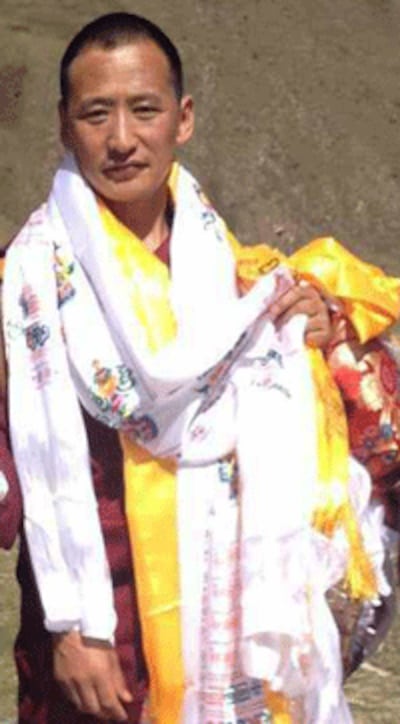Chinese authorities have released a senior Tibetan religious figure and a writer, both of whom had campaigned to protect the Tibetan language, after they completed their full terms in prison, according to sources in the region and in exile.
Writer Sungrab Gyatso’s health had deteriorated during his three-year prison term, the sources said, citing kidney and back problems.
He and Adrel Lobsang Tenzin Rinpoche of the Wonpo monastery in Sichuan province’s Sershul (in Chinese, Shiqu) county had been jailed for activities deemed to have challenged Chinese rule and were greeted as heroes by supporters who lined the roads to welcome them following their release this month, the sources said.
Adrel Lobsang Tenzin Rinpoche, who served five years, was released on May 15 and returned to Wonpo monastery on May 25 “amid a grand reception and welcome by the monks and his followers,” an India-based Tibetan monk told RFA’s Tibetan Service this week.
“Local devotees offered prayers for his long life, and Lama Adrel preached to them on the importance of preserving the Tibetan language and unity among Tibetans,” Jampa Yonten said, citing sources in the region.
“In a few days, Adrel Rinpoche will visit the Adrel monastery in Chumarleb [in Chinese, Qumalai] county in [Qinghai’s] Yulshul [in Chinese, Yushu] Tibetan Autonomous Prefecture,” Yonten added.
'State secrets'
Adrel Rinpoche was detained on March 15, 2008 in the Tibetan regional capital Lhasa and was sentenced to a five-year term after being charged with disclosing “state secrets,” Yonten said.
His three sons—Dasher, Lodroe, and Sonam Dragpa—were each sentenced in the same year to 10-year terms and are still serving out their sentences, he said.
The nature of the accusations made against Adrel Rinpoche and his sons was not immediately clear, but the charge of disclosing state secrets is sometimes made against Tibetans who spread news of Tibetan protests abroad.
“Nine monks were also detained in the Wonpo area in October 2012 and are still being held, and the local Tibetan community is very worried about them,” Yonten added.
Significant contributions

Meanwhile, Sungrab Gyatso, a Tibetan monk and writer, returned on May 21 to his home in Gansu province’s Machu (in Chinese, Maqu) county after serving three years for his role in protests supporting use of the Tibetan language, a Tibetan resident of the area said.
“Local Tibetans lined up on both sides of the road and welcomed him by offering ceremonial scarves as a sign of respect and regard amid great joy and celebration,” the source told RFA’s Tibetan Service, speaking on condition of anonymity.
Gyatso, 37, had made “significant” contributions to popular movements to preserve the Tibetan language and promote its use, RFA’s source said.
“I am delighted at his release, but am worried about how the Chinese [authorities] may treat him in the future if he continues with these efforts,” he said.
Separately, Machu Lhamo Kyab, a Tibetan living in exile, voiced concern for Gyatso’s health, citing information gained from sources in the region.
“I’ve heard that he is having trouble with his kidneys and his back, and I am worried about his health,” he said.
A popular teacher
Gyatso, a monk at the Mura monastery in Machu, was editor of a local Tibetan-language newspaper, The Path of Hope, and was a popular teacher of the Tibetan language in nomad areas, according to earlier reports.
Suspected as a ringleader of language-rights protests by Machu county middle school students in 2010, he was detained in March of that year and sentenced in December to a three-year term in prison, sources said.
China has jailed scores of Tibetan writers, artists, singers, and educators for asserting Tibetan national identity and civil rights since widespread protests swept the region in 2008.
Meanwhile, a total of 118 Tibetans have set themselves ablaze to challenge Beijing’s rule in Tibetan areas and to call for the return of exiled spiritual leader the Dalai Lama since the wave of fiery protests began in February 2009.
Reported by Lumbum Tashi and Lobe for RFA’s Tibetan Service. Translated by Dorjee Damdul. Written in English by Richard Finney.
